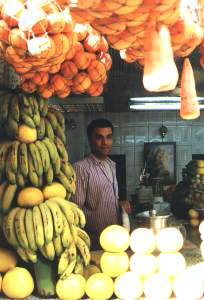 Thriving export potential Thriving export potential

Egypt has been trying to improve the productivity of its agriculture, which represents 16% of GDP and employs a third of the country’s active workforce. Agriculture is growing at a rate of about 3 % growth per year, which is less than the economy in general. The major crops are cotton, rice, maize, wheat, clover, beans, sugar cane, citrus and vegetables. From complete self sufficiency in the early
1970s, Egypt has become a net importer of several basic food items – it is for example the largest importer of U.S. wheat in the world. Egypt has typically run a trade deficit and as the economy grows, the demand for imported goods is increasing. Figures speak for themselves : total exports in 1997-98 reached $5,2 billion, while imports were
$15.5 billion. Consequently the government has initiated a major drive to expand exports and in some cases has recently been imposing informal restrictions on imports in addition to already high tariffs.
Because of this balance trade deficit, Egypt is trying to increase its exports of agricultural and processed food products. A leader in this effort is Rachid Mohamed Rachid , chairman of Fine Foods Group-Unilever, a joint venture with Unilever. The company produces a variety of food and beverages, of which 15 % are for export. Rachid sees enormous potential in exporting value added food products from Egypt to other Middle East neighbors. As he puts it, "Egypt is in the heart of the Middle East.
|

There are at least 15 or 20 countries that share with us a lot of common habits in food and drinks." As head of the agro-business promotion committee for the President’s Council of the Gore-Mubarak partnership for economic growth and development, Rachid is also promoting investment from the United States to the agro-business in Egypt. Among Egypt’s exports are T-shirts to Europe and the United States and a variety of vegetables to Europe. Alexandria shipper Kareem Salama says his Salamarine Egypt Trade
& Transport company relies on those two products as well as contracts with Asia to run his 60-employee shipping company. He has forecast a 10 % increase in his market share for the American market for this year.
To promote Egyptian exports a huge event called Aid to Trade will be held in Alexandria from June 18-24 1999. In addition to a conference, the event will include 12 exhibitions for Egyptian products in various hotels. Egypt’s Ministry of Trade and Supply has also been working hard to establish free trade agreements with all of its Arab neighbors. Egypt recently joined COMESA, the Central African trading block. Negotiations are underway to be included in the newly created Euro-Mediterranean free trade block and Egypt is also negotiating with the United States to conclude a free trade agreement. Although balancing its trade deficit is not likely to happen any time soon, Egypt ministers believe the country can achieve a much greater level of export, and Egypt has already demonstrated that it is a thriving market for exports. |

